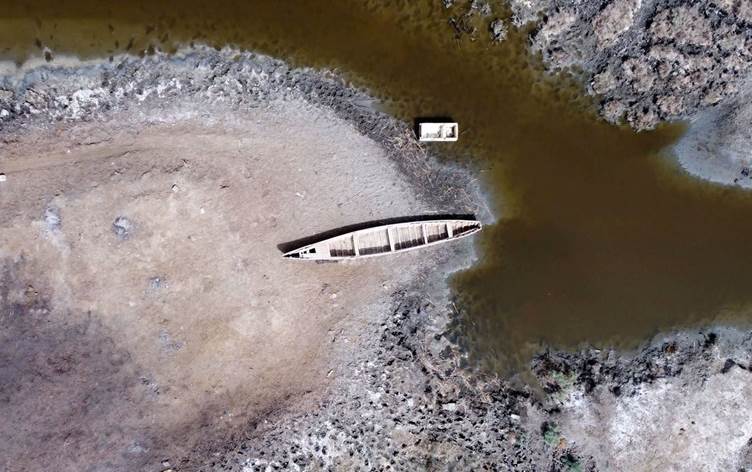ERBIL, Kurdistan Region - Al-Hammar marshes in Dhi Qar is one of the largest marshes in Iraq and the Middle East. It is a source of income for many of the area’s residents, but according to locals, the marshes have been neglected by authorities for years, resulting in declining water levels and jeopardizing their livelihood.
“Al-Hammar marshes have a very beautiful and unique nature. It used to be a rich marshland for fish and different kinds of living beings. It has been nearly a year since the marshes have almost dried up completely,” Sayid Ahmad, a fisher in Dhi Qar, told Rudaw on Thursday.
“The marshes get 95 percent of their nutrition from the general downstream project. The water [of the project] is dirty and not suitable for feeding the marshes because it is from sewage water,” he added.
Al-Hammar Marshes is located in Dhi Qar province in southern Iraq. In addition to its unique nature and being home to large numbers of birds and wildlife animals, it is also a source of livelihood for some of the residents, who earn their living from the marshlands by harvesting and selling reeds, raising cattle, and fishing.
Head of Dhi Qar’s environmental directorate warned of the danger of the marshes drying up entirely.
“Dhi Qar province is one of the most fragile provinces to the effects of climate change,” Karim Hani Muhammad, told Rudaw, adding “Previously, the water of the Euphrates and Tigris Rivers were feeding these marshes but the decrease in the water levels of both rivers had a negative and direct impact on these marshlands.”
Iraq's troubled marshlands were subject to a massive drainage campaign by former dictator Saddam Hussein in 1991, who ordered their drainage as punishment for local communities who were protecting insurgents he sought to hunt down.
The marshes were added to the list of UNESCO World Heritage sites in 2016 due to their biodiversity and ancient history.
The UN classifies Iraq as the fifth most vulnerable country in the world to the effects of climate change. Droughts are more frequent and longer. Water reserves have decreased by half since last year due to a combination of drought, lack of rainfall, and declining river levels, according to the water ministry.
“Al-Hammar marshes have a very beautiful and unique nature. It used to be a rich marshland for fish and different kinds of living beings. It has been nearly a year since the marshes have almost dried up completely,” Sayid Ahmad, a fisher in Dhi Qar, told Rudaw on Thursday.
“The marshes get 95 percent of their nutrition from the general downstream project. The water [of the project] is dirty and not suitable for feeding the marshes because it is from sewage water,” he added.
Al-Hammar Marshes is located in Dhi Qar province in southern Iraq. In addition to its unique nature and being home to large numbers of birds and wildlife animals, it is also a source of livelihood for some of the residents, who earn their living from the marshlands by harvesting and selling reeds, raising cattle, and fishing.
Head of Dhi Qar’s environmental directorate warned of the danger of the marshes drying up entirely.
“Dhi Qar province is one of the most fragile provinces to the effects of climate change,” Karim Hani Muhammad, told Rudaw, adding “Previously, the water of the Euphrates and Tigris Rivers were feeding these marshes but the decrease in the water levels of both rivers had a negative and direct impact on these marshlands.”
Iraq's troubled marshlands were subject to a massive drainage campaign by former dictator Saddam Hussein in 1991, who ordered their drainage as punishment for local communities who were protecting insurgents he sought to hunt down.
The marshes were added to the list of UNESCO World Heritage sites in 2016 due to their biodiversity and ancient history.
The UN classifies Iraq as the fifth most vulnerable country in the world to the effects of climate change. Droughts are more frequent and longer. Water reserves have decreased by half since last year due to a combination of drought, lack of rainfall, and declining river levels, according to the water ministry.








Comments
Rudaw moderates all comments submitted on our website. We welcome comments which are relevant to the article and encourage further discussion about the issues that matter to you. We also welcome constructive criticism about Rudaw.
To be approved for publication, however, your comments must meet our community guidelines.
We will not tolerate the following: profanity, threats, personal attacks, vulgarity, abuse (such as sexism, racism, homophobia or xenophobia), or commercial or personal promotion.
Comments that do not meet our guidelines will be rejected. Comments are not edited – they are either approved or rejected.
Post a comment